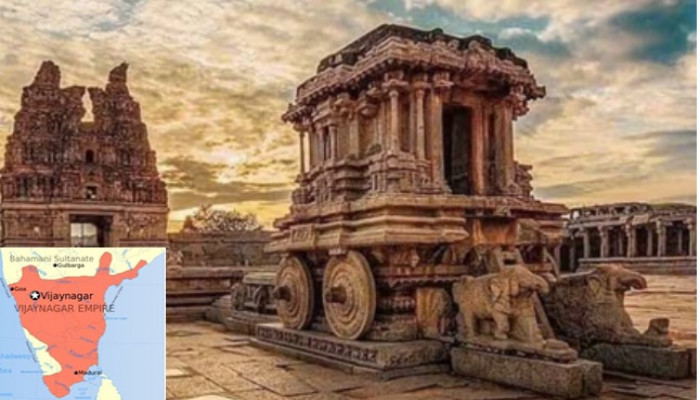Vijayanagara: The Empire That Belonged to All of Us
- In History & Culture
- 12:06 PM, Oct 29, 2025
- Vishnu Vardhan
Sometimes I read these online debates and just sigh.
Someone posts “Telugu architecture” and someone else replies, “They always accept Kannadigas as fathers.”
It’s like watching children fight over the moon when both are standing in its light.
I was born in Ballari — the soil where this whole debate takes shape.
My mother still laughs and says I spoke Kannada before I spoke Telugu.
And today, I speak Telugu, Kannada, Hindi, Tamil, Malayalam, Tulu, and Sanskrit — not as trophies, but as memories of the land that raised me.
Because where I come from, languages aren’t fences.
They’re rivers — flowing into the same ocean.
That’s why I can’t stay silent when people try to cut civilisation into states and hashtags.
Let’s talk truth.
Sri Krishnadevaraya, the greatest emperor of the South, wrote in Telugu and Sanskrit — not Persian, not Arabic, but the languages of his heart and civilisation.
His Ashta Diggajas were all Telugu and Sanskrit poets, the pillars of our literary golden age.
But his guru, Vyasaraja (Vyāsatīrtha), was a Kannada saint and philosopher, the guiding intellect behind his dharmic rule.
And under that same sun lived Purandaradasa, a Kannada saint who became the father of Carnatic music.
Now here’s the beauty people miss:
Krishnadevaraya’s greatest work, Amuktamalyada, written in classical Telugu, was about Andal, the Tamil saint-poetess of Srivilliputhur — the goddess who offered garlands to Vishnu in pure love.
A Telugu king writing in Telugu about a Tamil saint, guided by a Kannada guru, in Sanskritic rhythm — this was Vijayanagar.
Not an empire of one language, but a symphony of many, tuned to the same divine frequency.
And yet people today fight over who “owns” it.
Some say, “Hampi is in Karnataka, so Vijayanagar was Kannada.”
But let’s remember — Ballari joined Karnataka only in 1957, when borders were drawn based on language.
Even today, over 60% of Ballari’s people speak Telugu.
So, saying Vijayanagar was Kannada because Hampi lies there now is like saying Byzantium was Turkish because Istanbul happens to be in Turkey.
Borders are man-made.
Civilisation is not.
Vijayanagar wasn’t built for pride. It was built for protection.
When the Tughlaq armies destroyed everything from Hoysala to Chola — temples, knowledge, devotion — two brothers, Harihara and Bukka, rose with the blessings of Sage Vidyaranya.
They didn’t ask what language to use.
They asked how to save Dharma.
That’s why they built Vijayanagar — a fortress of faith, art, and knowledge that became the beating heart of southern Bharat.
It stretched from sea to sea — Karnataka, Andhra, Tamil Nadu, Kerala, Odisha — all one rhythm.
They built both Hampi and Lepakshi.
They prayed in Tirumala and Krishna Devaraya and his wives' bronze statues are in the temple.
He married a Gajapati princess from Odisha, and he comes from the Tuluva lineage of Mangalore.
You must listen to Tulu.
It is so many words from Kannada, Malayalam, Telugu & even Hindi.
Our scripts looked alike, our music echoed the same bhakti, our gods shared the same homes.
Purandaradasa in Kannada, Annamacharya in Telugu, Andal in Tamil — they didn’t compete; they completed one another.
That’s why I laugh when people say “Kannadiga” or “Telugu” empire.
I am both — born from one, speaking the other, belonging to all.
The soil of Ballari itself is bilingual.
Every street hums with both accents, every temple priest knows both tongues, every festival carries both rhythms.
It’s not confusion — it’s coherence.
Vijayanagar was that coherence in its highest form — civilisation in armour.
The place where language became prayer, where architecture became philosophy, where diversity became strength.
So, to those who try to divide us — remember this:
Before “India” was a country, the South already lived as one civilisation.
Krishnadevaraya proved it when he wrote about Andal.
Purandaradasa sang it.
Vyasaraja taught it.
Vidyaranya envisioned it.
And Ballari — my birthplace — still breathes it.
Let the shallow fight over fatherhood.
The wise remember the lineage.
Vijayanagar was not Telugu or Kannada.
It was the memory of Bharat remembering itself — through stone, song, and soul.







Comments